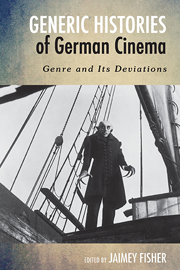Book contents
- Frontmatter
- Contents
- Acknowledgments
- Introduction: Toward Generic Histories—Film Genre, Genre Theory, and German Film Studies
- 1 Parallel Modernities: From Haunted Screen to Universal Horror
- 2 The Essay Film and Its German Variations
- 3 The Limits of Futurity: German Science-Fiction Film over the Course of Time
- 4 The Situation Is Hopeless, but Not Desperate: UFA's Early Sound Film Musicals
- 5 Resisting the War (Film): Wicki's “Masterpiece” Die Brücke and Its Generic Transformations
- 6 Ironizing Identity: The German Crime Genre and the Edgar Wallace Production Trend of the 1960s
- 7 From Siodmak to Schlingensief: The Return of History as Horror
- 8 Producing Adaptations: Bernd Eichinger, Christiane F., and German Film History
- 9 Exceptional Thrills: Genrification, Dr. Mabuse, and Das Experiment
- 10 The Heimat Film in the Twenty-First Century: Negotiating the New German Cinema to Return to Papas Kino
- 11 The Romantic Comedy and Its Other: Representations of Romance in German Cinema since 1990
- 12 Yearning for Genre: The Films of Dominik Graf
- Bibliography
- Notes on the Contributors
- Index
5 - Resisting the War (Film): Wicki's “Masterpiece” Die Brücke and Its Generic Transformations
Published online by Cambridge University Press: 05 December 2013
- Frontmatter
- Contents
- Acknowledgments
- Introduction: Toward Generic Histories—Film Genre, Genre Theory, and German Film Studies
- 1 Parallel Modernities: From Haunted Screen to Universal Horror
- 2 The Essay Film and Its German Variations
- 3 The Limits of Futurity: German Science-Fiction Film over the Course of Time
- 4 The Situation Is Hopeless, but Not Desperate: UFA's Early Sound Film Musicals
- 5 Resisting the War (Film): Wicki's “Masterpiece” Die Brücke and Its Generic Transformations
- 6 Ironizing Identity: The German Crime Genre and the Edgar Wallace Production Trend of the 1960s
- 7 From Siodmak to Schlingensief: The Return of History as Horror
- 8 Producing Adaptations: Bernd Eichinger, Christiane F., and German Film History
- 9 Exceptional Thrills: Genrification, Dr. Mabuse, and Das Experiment
- 10 The Heimat Film in the Twenty-First Century: Negotiating the New German Cinema to Return to Papas Kino
- 11 The Romantic Comedy and Its Other: Representations of Romance in German Cinema since 1990
- 12 Yearning for Genre: The Films of Dominik Graf
- Bibliography
- Notes on the Contributors
- Index
Summary
One hesitates to start with any sort of polled survey, but such surveys both illuminate and constitute the wider film culture that the present volume's generic approach foregrounds. In a 1995 survey celebrating the centennial of cinema, Bernhard Wicki's Die Brücke (The Bridge, 1959) was named by industry personnel, critics, and scholars the thirteenth most significant work of German cinema's first century, placing it between Der Student von Prag (The Student of Prague, 1913) and Abschied von Gestern (Yesterday's Farewell, released in English as Yesterday Girl, 1966); even more impressively, this remarkably high ranking rendered it the list's third highest postwar film (the top of the list is dominated by films of the celebrated Weimar era). Critics placed it ahead not only of all the works of the so-called New German Cinema but even of Weimar classics such as Lang's Dr. Mabuse, der Spieler (Dr. Mabuse, the Gambler, 1922); Murnau's Der letzte Mann (The Last Man, released in English as The Last Laugh 1925); and Pabst's famously controversial Die 3-Groschen-Oper (Three-Penny Opera, 1931). Although this survey hardly proves quality, it underscores a contradiction within the broader film culture of which Die Brücke and this kind of survey are both part: despite this dignified company on the survey's list, Die Brücke has received very little scholarly attention, which is all the more surprising given that Die Brücke is also the most highly placed war film in the survey.
- Type
- Chapter
- Information
- Generic Histories of German CinemaGenre and its Deviations, pp. 109 - 132Publisher: Boydell & BrewerPrint publication year: 2013



